#unix time
Explore tagged Tumblr posts
Text
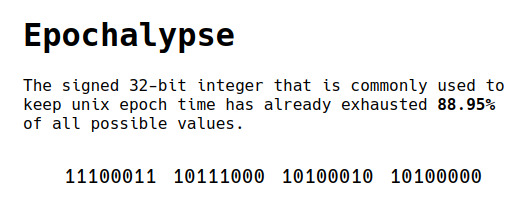
A countdown to the end of 32-bit unix time
14 notes
·
View notes
Text
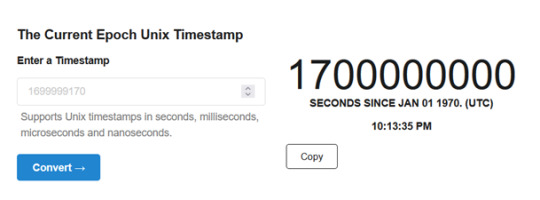
happy unixversary to those who celebrate
157 notes
·
View notes
Text

#bluesky#bluesky out of context#overheard#tujungadude.bsky.social#doge#unix#unix time#posix time#computing#epoch
2 notes
·
View notes
Text
anyone else excited for y2k38
2 notes
·
View notes
Text
Bad news guys. Turns out that when the universe was created, gender was stored as a 32-bit signed integer. Yeah a few new genders were created last night and we had an overflow error. Currently there's -(2^31) genders and queer rights have been sent back to what they were in 1901.
0 notes
Text
So, we all know humans have a number of different calendars, right? And they all place year 0 somewhere else according to their own very special golden important reason.
Today we're going to look at computers, WHO ALSO HAVE THEIR OWN YEAR 0.
It is called the 'epoch' (which, as a French speaker, I find hilarious). When is the epoch, you might ask? Well, that depends on the operating system. Humans can haz Gregorian, Mayan, lunar, Julian, etc. calendar flavours, computers can haz Unix, Windows, Garmin FIT... epoch flavours.
Mr Unix Epoch (doesn't he sound like a villain in some cyberpunk story) is one of the most widely used, a standard in many OS, programming languages, databases etc. Unix time counts in seconds When is its year 0? Thursday 1 January 1970 00:00:00 UT. Why?
"The current epoch of 1 January 1970 00:00:00 UTC was selected arbitrarily by Unix engineers because it was considered a convenient date to work with."
Thus, where humans chose their years 0 for its extraordinary events, computers get given their years 0 for the mundane convenience of it. May you live in uninteresting times.
5 notes
·
View notes
Text
why am I like this? lol anyone else or just me that does this?
*me to people routinely when I see their OS and network is windows* so that means the eye doctor every time I go, and maybe regular doctor too, lol
"why don't you all use linux/unix/bsd? it's more secure than windows cause no one codes viruses for it as often cause it's not as widely used"
them: "cause we want our tools to work"
so are their tools so specialized that they need specialized drivers for them and thus can't work with them under unix/bsd/linux?
it'd be more secure tho, wouldn't it?
heck from one of them I got "why don't you go to college and work in tech?" genuine question~~~
and the answer is anxiety~~~ :(
#personal#thoughts#thinking#linux#unix#bsd#windows#os#operating system#operating systems#question#questions#I do this almost every time#lol#why am I like this?#isn't linux/unix/bsd more secure anyway?#could they get their stuff running and working on linux/unix/bsd?#personal gripe but it bugs me they're stuck on windnows#supposed to be a fun question but I'm very serious w stuff#network#networks#why you no run linux/unix/bsd?#it's more secure isn't it?#or is it not and my argument is flawed? it just is cause they're not used normally and threats aren't written to target those systems#i think#could be very wrong
0 notes
Text
happy 1699561666 to people who write time in a consistent denary format
By the way happy 9/11 to all the people who use a reasonable method of writing dates
802 notes
·
View notes
Text

There is a computer bug waiting to jump at us in about 14 years. Watch out for it, or you'll suddenly find yourself back in the year 1901.
0 notes
Text
Who Broke the Internet? Part III

I'm on a 20+ city book tour for my new novel PICKS AND SHOVELS. Catch me in PDX on Jun 20 at BARNES AND NOBLE with BUNNIE HUANG. After that, it's LONDON (Jul 1) and MANCHESTER (Jul 2).

Episode 3 of "Understood: Who Broke the Internet?" (my new CBC podcast about enshittification) just dropped. It's called "In God We Antitrust," and it's great:
https://www.cbc.ca/listen/cbc-podcasts/1353-the-naked-emperor/episode/16147052-in-god-we-antitrust
The thesis of this four-part series is pretty straightforward: the enshittification of the internet was the result of an enshittogenic policy environment. Platforms always had the technical means to scam us and abuse us. Tech founders and investors always included a cohort of scumbags who would trade our happiness and wellbeing for their profits. What changed was the consequences of giving in to those impulses. When Google took off, its founders' mantra was "competition is just a click away." If someone built a better search engine, users could delete their google.com bookmarks, just like they did to their altavista.com bookmarks when Google showed up.
Policymakers – not technologists or VCs – changed the environment so that this wasn't true anymore:
https://pluralistic.net/2025/05/08/who-broke-the-internet/#bruce-lehman
In last week's episode, we told the story of Bruce Lehman, the Clinton administration's Copyright Czar, who swindled the US government into passing a law that made it illegal to mod, hack, reverse-engineer or otherwise improve on an existing technology:
https://pluralistic.net/2025/05/13/ctrl-ctrl-ctrl/#free-dmitry
This neutralized a powerful anti-enshittificatory force: interoperability. All digital tech is born interoperable, because of the intrinsic characteristics of computers, their flexibility. This means that tech is inherently enshittification-resistant. When a company enshittifies its products or services, its beleaguered users and suppliers don't have to wait for a regulator to punish it. They don't have to wait for a competitor to challenge it.
Interoperable tools – ad-blockers, privacy blockers, alternative clients, mods, plugins, firmware patches and other hacks – offer immediate, profound relief from enshittification. Every ten foot pile of shit that a tech company drops into your life can be met with an eleven foot ladder of disenshittifying, interoperable technology.
That's why Lehman's successful attack on tinkering was so devastating. Before Lehman, tech had achieved a kind of pro-user equilibrium: every time a company made its products worse, they had to confront a thousand guerrilla technologists who unilaterally unfucked things: third party printer ink, file-format compatibility, protocol compatibility, all the way up to Unix, a massive operating system that was painstakingly re-created, piece by piece, in free software.
Lehman offered would-be enshittifiers a way to shift this equilibrium to full enshittification: just stick a digital lock on your product. It didn't even matter if the lock worked – under Lehman's anticircumvention law, tampering with a lock, even talking about weaknesses in a lock, became a literal felony, punishable by a five-year prison sentence and a $500K fine. Lehman's law was an offer no tech boss would refuse, and enshittification ate the world.
But Lehman's not the only policymaker who was warned about the consequences of his terrible plans, who ignored the warnings, and who disclaims any responsibility for the shitty world that followed. Long before Lehman's assault on tech policy, another group of lawyers and economists laid waste to competition policy.
In the 1960s and 1970s, a group of Chicago School economists conceived of an absurd new way to interpret competition law, which they called "the consumer welfare standard." Under this standard, the job of competition policy was to encourage monopolies to form, on the grounds that monopolies were "efficient" and would lower prices for "consumers."
The chief proponent of this standard was Robert Bork, a virulent racist whose most significant claim to fame was that he was the only government lawyer willing to help Richard Nixon illegally fire officials who wouldn't turn a blind eye to his crimes. Bork's long record of unethical behavior and scorching bigotry came back to bite him in the ass when Ronald Reagan tried to seat him on the Supreme Court, during a confirmation hearing that Bork screwed up so badly that even today, we use "borked" as a synonym for anything that is utterly fucked.
But Bork's real legacy was as a pro-monopoly propagandist, whose work helped shift how judges, government enforcers, and economists viewed antitrust law. Bork approached the text of America's antitrust laws, like the Sherman Act and the Clayton Act, with the same techniques as a Qanon follower addressing a Q "drop," applying gnostic techniques to find in these laws mystical coded language that – he asserted – meant that Congress had intended for America's anti-monopoly laws to actually support monopolies.
In episode three, we explore Bork's legacy, and how it led to what Tom Eastman calls the internet of "five giant websites, each filled with screenshots of the other four." We got great interviews and old tape for this one, including Michael Wiesel, a Canadian soap-maker who created a bestselling line of nontoxic lip-balm kits for kids, only to have Amazon shaft him by underselling him with his own product.
But the most interesting interview was with Lina Khan, the generational talent who became the youngest-ever FTC chair under Joe Biden, and launched an all-out assault on American monopolies and their vile depredations:
https://pluralistic.net/2023/07/14/making-good-trouble/#the-peoples-champion
Khan's extraordinary rise to power starts with a law review paper she wrote in her third year at Yale, "Amazon's Antitrust Paradox," which became the first viral law review article in history:
https://www.yalelawjournal.org/note/amazons-antitrust-paradox
"Amazon's Antitrust Paradox" was a stinging rebuke to Bork and his theories, using Amazon's documented behavior to show that after Amazon used its monopoly power to lower prices and drive rivals out of the market, it subsequently raised prices. And, contrary to Bork's theories, those new, high prices didn't conjure up new rivals who would enter the market with lower prices again, eager to steal Amazon's customers away. Instead, Amazon's demonstrated willingness to cross-subsidize divisions gigantic losses to destroy any competitor with below-cost pricing created a "kill zone" of businesses adjacent to the giant's core enterprise that no one dared enter:
https://www.thebignewsletter.com/p/how-biden-can-clean-up-obamas-big
The clarity of Khan's writing, combined with her careful research and devastating conclusions dragged a vast crowd of people who'd never paid much attention to antitrust – including me! – into the fray. No wonder that four years later, she was appointed to serve as the head of the FTC, making her the most powerful consumer rights regulator in the world.
We live in an age of monopolies, with cartels dominating every part of our lives, acting as "autocrats of trade" and "kings over the necessaries of life," the corporate dictators that Senator John Sherman warned about when he was stumping for the 1890 Sherman Act, America's first antitrust law:
https://pluralistic.net/2022/02/20/we-should-not-endure-a-king/
Bork and his co-religionists created this age. They're the reason we live in world where we have to get our "necessaries of life" from a cartel, a duopoly or a monopoly. It's not because the great forces of history transformed the economy – it's because of these dickheads:
https://www.openmarketsinstitute.org/learn/monopoly-by-the-numbers
This episode of "Understood: Who Borked the Internet?" draws a straight line from those economists and their ideas to the world we live in today. It sets up the final episode, next week's "Kick 'Em in the Dongle," which charts a course for us to escape from the hellscape created by Bork, Lehman, and their toadies and trolls.
You can get "Understood: Who Broke the Internet?" in any podcast app, even the seriously enshittified ones (which, let's be real here, is most of them). Here's a direct link to the RSS:
https://www.cbc.ca/podcasting/includes/nakedemperor.xml

If you'd like an essay-formatted version of this post to read or share, here's a link to it on pluralistic.net, my surveillance-free, ad-free, tracker-free blog:
https://pluralistic.net/2025/05/19/khan-thought/#they-were-warned
#pluralistic#enshittification#podcasts#understood#cbc#cbc understood#antitrust#trustbusting#robert bork#oligarchy#amazon#lina khan#ftc#amazons antitrust paradox
167 notes
·
View notes
Text
On the Gregorian calendar. You can get way more if you use other calendars.
If you use Unix Time (what your computer uses) the next one will be Thursday, January 2, 2025 8:12:49, which is 41663^2 seconds since 00:00:00 UTC January 1, 1970. The one after that will be on Friday.
not to be a number nerd on main but 2025 (45^2) will be the only square year most of us ever experience. the last one was 1936 and the next one will be 2116
110K notes
·
View notes
Text

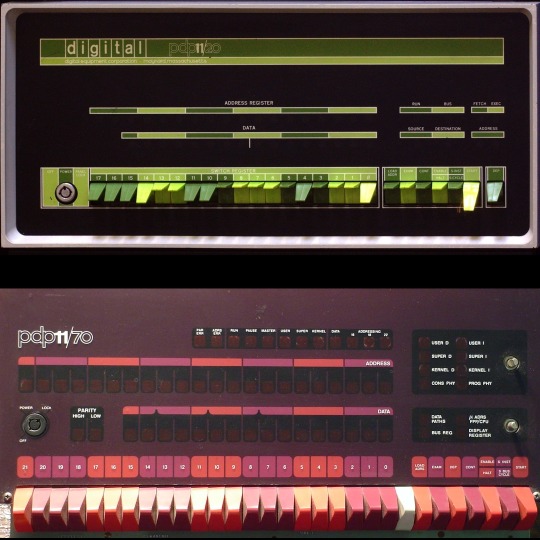
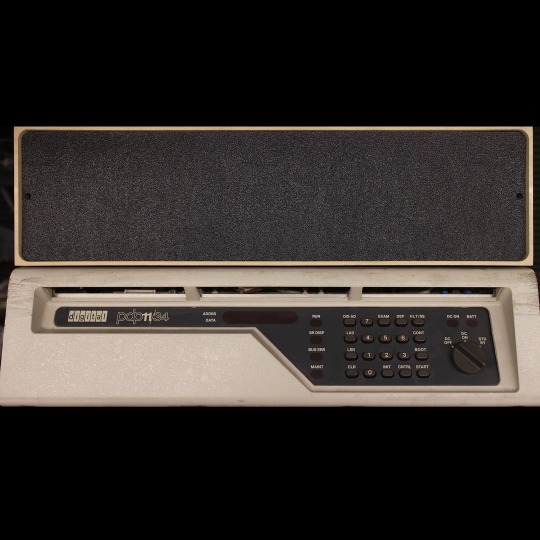


🎄💾🗓️ Day 4: Retrocomputing Advent Calendar - The DEC PDP-11! 🎄💾🗓️
Released by Digital Equipment Corporation in 1970, the PDP-11 was a 16-bit minicomputer known for its orthogonal instruction set, allowing flexible and efficient programming. It introduced a Unibus architecture, which streamlined data communication and helped revolutionize computer design, making hardware design more modular and scalable. The PDP-11 was important in developing operating systems, including the early versions of UNIX. The PDP-11 was the hardware foundation for developing the C programming language and early UNIX systems. It supported multiple operating systems like RT-11, RSX-11, and UNIX, which directly shaped modern OS design principles. With over 600,000 units sold, the PDP-11 is celebrated as one of its era's most versatile and influential "minicomputers".
Check out the wikipedia page for some great history, photos (pictured here), and more -
And here's a story from Adafruit team member, Bill!
The DEC PDP-11 was the one of the first computers I ever programmed. That program was 'written' with a soldering iron.
I was an art student at the time, but spending most of my time in the engineering labs. There was a PDP-11-34 in the automation lab connected to an X-ray spectroscopy machine. Starting up the machine required toggling in a bootstrap loader via the front panel. This was a tedious process. So we ordered a diode-array boot ROM which had enough space to program 32 sixteen bit instructions.
Each instruction in the boot sequence needed to be broken down into binary (very straightforward with the PDP-11 instruction set). For each binary '1', a diode needed to be soldered into the array. The space was left empty for each '0'. 32 sixteen bit instructions was more than sufficient to load a secondary bootstrap from the floppy disk to launch the RT-11 operating system. So now it was possible to boot the system with just the push of a button.
I worked with a number DEC PDP-11/LSI-11 systems over the years. I still keep an LSI-11-23 system around for sentimental reasons.
Have first computer memories? Post’em up in the comments, or post yours on socialz’ and tag them #firstcomputer #retrocomputing – See you back here tomorrow!
#dec#pdp11#retrocomputing#adventcalendar#minicomputer#unixhistory#cprogramming#computinghistory#vintagecomputers#modulardesign#scalablehardware#digitalcorporation#engineeringlabs#programmingroots#oldschooltech#diodearray#bootstraploader#firstcomputer#retrotech#nerdlife
291 notes
·
View notes
Text
I have learned how to time travel in my likes. I am unstoppable in my quest to clear them out. If I jumpscare you with notes on ancient posts, this is why. Sorry for the jumpscare but not sorry, you had a good post that stood the test of time so into the queue you go. Get reblogged, bro
(If you're curious how to time travel your likes, use the URL tumblr.com/likes?before= and after the equal sign put the Unix timestamp for when you'd like to travel back to. For example, https://www.tumblr.com/likes?after=1666801075 for October 26th, 2022. You can use any online converter to get that Unix timestamp)
185 notes
·
View notes
Text
On Celebrating Errors

Isn't it beautiful? The lovely formatted tables of register and stack contents, the trace of function addresses and parameters, the error message ... it's the most beautiful kernel panic I have ever seen.
Why on earth would I be so excited to see a computer crash? What could possibly be beautiful about a kernel panic?
This kernel panic is well-earned. I fought hard to get it.
This kernel panic came from a current NetBSD kernel, freshly compiled and running on Wrap030, my 68030 homebrew computer. It is the result of hours upon hours of work reading through existing code, scattered documentation and notes, writing and rewriting, and endless compiling.
And it's just the start.
As I've said before, a goal of this project has always been to build something capable of running some kind of Unix-like operating system. Now that I finally have all the necessary pieces of hardware, plus a good bootloader in ROM, it's time to give it a shot. I'm not that great with this type of programming, but I have been getting better. I might just be able to brute force my way through hacking together something functional.
It is hard.
There is some documentation available. The man(9) pages are useful, and NetBSD has a great guide to setting up the build environment for cross-compiling the kernel. There are some published papers on what some people went through to port NetBSD to this system or that. But there's nothing that really explains what all these source code files are, and which parts really need to be modified to run on a different system.
I had a few false starts, but ultimately found an existing 68k architecture, cesfic, which was a bare minimum configuration that could serve well as a foundation for my purposes. I copied the cesfic source directory, changed all instances of the name to wrap030, made sure it still compiled, then set about removing everything that I didn't need. It still compiled, so now it's was time to add in what I did need.
... how ... do I ... ?
This is where things get overwhelming very quickly. There is documentation on the core functions required for a new driver, there's documentation on the autoconf system that attaches drivers to devices in the tree, and there's plenty of drivers already to reference. But where to start?
I started by trying to add the com driver for the 16550 UARTs I'm using. It doesn't compile because I'm missing dependencies. The missing functions are missing because of a breaking change to bus.h at some point; the com driver expects the new format but the cesfic port still uses the old. So I needed to pull in the missing functions from another m68k arch. Which then required more missing functions and headers to be pulled in. Eventually it compiled without error again, but that doesn't mean it will actually run. I still needed to add support for my new programmable timer, customize the startup process, update hardware addresses, make sure it was targeting 68030 instead of 68040 ...
So many parts and pieces that need to be updated. Each one requiring searching for the original function or variable declaration to confirm expected types or implementation, then searching for existing usages to figure out what it needs ... which then requires searching for more functions and variable types.
But I got something that at least appeared to have all the right parts and compiled without error. It was time to throw it on a disk, load it up, and see what happened.
Nothing happened, of course. It crashed immediately.
I have no debugging workflow I can rely on here, and at this stage there isn't even a kernel console yet. All I could do was add little print macros to the locore startup code and see where it failed. Guess, test, and revise.
I spent a week debugging the MMU initialization. If the MMU isn't properly configured, everything comes to an abrupt halt. Ultimately, I replaced the cesfic machine-specific initialization code and pmap bootstrapping code with functions from yet another m68k arch. And spent another day debugging before realizing I had missed a section that had comments suggesting it wasn't for the 68030 CPU, but turned out to be critical for operation of kernel memory allocation.
Until this point, I was able to rely on the low-level exception handling built into my bootloader if my code caused a CPU exception. But with the MMU working, that code was no longer mapped.
So then came another few hours learning how to create a minimal early console driver. An early console is used by the kernel prior to the real console getting initialized. In this case, I'm using the MC6850 on my mainboard for the early console, since that's what my bootloader uses. And finally the kernel was able to speak for itself.
It printed its own panic.
The first thing the kernel does is initialize the console. Which requires that com driver and all the machine-specific code I had to write. The kernel is failing at its step #1.
But at least it can tell me that now. And given all the work necessary to get to this point, that kernel panic data printing to the terminal is absolutely beautiful.
#troubleshooting#coding#os development#netbsd#homebrew computer#homebrew computing#mc68030#motorola 68k#motorola 68030#debugging#wrap030#retro computing
69 notes
·
View notes
Text
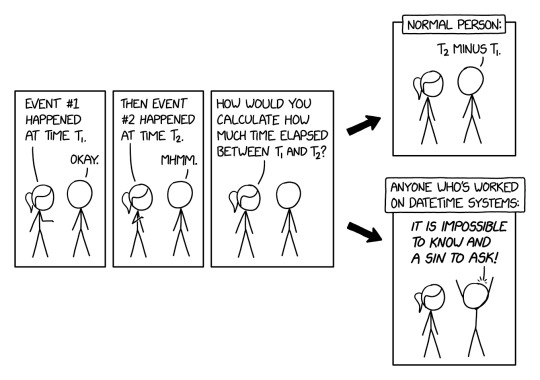
It's not just time zones and leap seconds. SI seconds on Earth are slower because of relativity, so there are time standards for space stuff (TCB, TGC) that use faster SI seconds than UTC/Unix time. T2 - T1 = [God doesn't know and the Devil isn't telling.]
DateTime [Explained]
Transcript Under the Cut
[Ponytail is talking to Cueball.] Ponytail: Event #1 happened at time T1. Cueball: Okay.
Ponytail: Then event #2 happened at time T2. Cueball: Mhmm.
Ponytail: How would you calculate how much time elapsed between T1 and T2?
[The comic splits into two paths, each with a caption at the top.]
[Path 1, upper right panel] Caption: Normal person: Cueball: T2 minus T1.
[Path 2, lower right panel] Caption: Anyone who's worked on datetime systems: [Cueball has his arms raised.] Cueball: It is impossible to know and a sin to ask!
869 notes
·
View notes
Text
Being neurodivergent is like you're a computer running some variation of Unix while the rest of the world runs Windows. You have the exact same basic components as other machines, but you think differently. You organize differently. You do things in a way that Windows machines don't always understand, and because of that, you can't use programs written for Windows. If you're lucky, the developer will write a special version of their program specifically with your operating system in mind that will work just as well as the original, and be updated in a similar time frame. But if not? You'll either be stuck using emulators or a translator program like Wine, which come with an additional resource load and a host of other challenges to contend with, or you'll have to be content with an equivalent, which may or may not have the same features and the ability to read files created by the other program.
However, that doesn't mean you're not just as powerful. Perhaps you're a desktop that just happens to run Mac or Linux. Maybe you're a handheld device, small and simple but still able to connect someone to an entire world. Or perhaps you're an industrial computer purposely-built to perform a limited number of tasks extremely well, but only those tasks. You may not even have a graphical user interface. You could even be a server proudly hosting a wealth of media and information for an entire network to access- perhaps even the entire Internet. They need only ask politely. You may not be able to completely understand other machines, but you are still special in your own way.
#actually autistic#autism#neurodivergent#neurodiversity#computers#this is so nerdy i'm sorry#i also hope it doesn't offend people#adhd#actually adhd#unix#linux#macintosh#windows#actually neurodivergent
1K notes
·
View notes